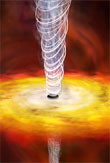
I wish I were so relaxed.
Kittenz, astronomy, science, photography and other four-legged snarky stuff.

WASHINGTON (AP) -- The simplest grammar, long thought to be one of the skills that separate man from beast, can be taught to a common songbird, new research suggests.

April 24, 2006—This is one sweet 16 that calls for more than just a first driver's license photo.
NASA and the European Space Agency today marked the 16th anniversary of the launch of the Hubble Space Telescope by releasing a brilliant new image captured by the orbiting observer.
The composite picture, taken last month, depicts the starburst galaxy Messier 82, a hothouse of rapidly forming stars some 12 million light-years away. The image features the long blue disk of the galaxy's core laced with fiery tendrils of hydrogen gas (shown in red). The image is the sharpest wide-angle view ever obtained of the galaxy.
Interstellar eye candy like this has been part of Hubble's stock in trade over the past 16 years, but the telescope has much more to show for its service than an album of cool images.
Since it was launched into space on April 24, 1990, the Hubble has contributed to some significant astronomical studies, from measuring the effects of mysterious dark matter to helping scientists determine the age of the universe itself.
NASA has tentatively cancelled missions to maintain the Hubble, citing safety concerns for astronauts after the destruction of the space shuttle Columbia in 2003.

A new study finds that the supermassive black holes at the hearts of some galaxies are the most fuel efficient engines in the universe.
"If you could make a car engine that was as efficient as one of these black holes, you could get about a billion miles out of a gallon of gas," said study team leader Steve Allen of the Kavli Institute for Particle Astrophysics and Cosmology at Stanford University. "In anyone's book, that would be pretty green."
The finding, made using NASA’s Chandra X-ray Observatory and announced in a media teleconference today, is giving scientists insights into how supermassive black holes generate energy and how they affect the galaxies where they make their homes.